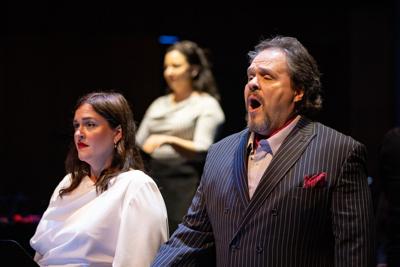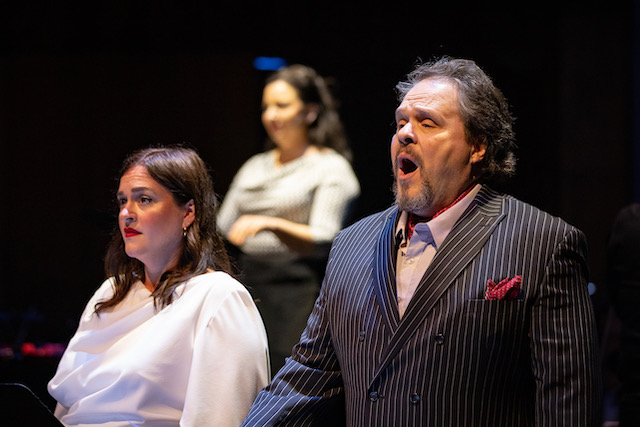Lush, Romantic opera makes North American debut
- M.L. Rantala, classical music critic
- Updated

The Korngold Rediscovered festival, held by the University of Chicago in partnership with Folks Operetta, offered the North American premiere of Erich Wolfgang Korngold’s opera “Die Kathrin” on Thursday night at the Logan Center Performance Hall.
The work, Korngold’s final opera, was completed in 1937 and scheduled for a Vienna premiere in 1938. Its story of a German woman falling in love with a Belgian soldier in the occupied Rhineland had to be changed to get around the Nazi censors. But making Kathrin Swiss rather than German was insufficient. As the Folks Operetta website promoting this milestone production notes, “Kathrin may have changed her nationality, but Korngold was still Jewish.”
The opera premiered to poor reviews in Sweden in 1939 and was first performed in Vienna in 1950. Now, 85 years after its completion, it came to Hyde Park and the results were glorious.
“Die Kathrin” highlights Korngold’s imaginative and evocative powers as a composer. He saw the story as a kind of folk tale: two poor lovers buffeted by adverse factors beyond their control, who eventually find happiness through perseverance. The music may have a more relaxed quality than his most admired opera “Die tote Stadt,” but the slightly lighter musical tone combined with the composer’s vivid exposition of color and lush harmonic treatments, make the musical aspect of “Die Kathrin” marvelous.
Soprano Ann Toomey sang the title role with commitment and passion. Her large voice filled the hall and she had power at the top of her range and delicacy in her middle register. She was matched in flair with tenor Corey Bix, who took the role of her lover, François. He had heroic sound and gleaming high notes.
Baritone Mark Delavan plays the villain Malignac, who has bamboozled Kathrin to travel with him to Marseilles in what seems like a sex trafficking caper. He offers dark, bold sound with a suave exterior. Soprano Stacey Tappan, decked out in a clingy gown with a white feather boa, was fantastic in the nightclub scene, offering a memorable performance in a decadent setting.
Commentators of this opera nearly always conclude that the story is the main problem with “Die Kathrin.” It is stuffed with so many coincidences that even Jung’s idea of synchronicity cannot carry the weight. The evil Malignac is murdered in the second act and François is found guilty of the crime. When he is released from prison and finds Kathrin, we learn that each of them believed the other had committed the murder, when in fact it was someone else altogether. At this point, near the end of the opera, you wonder how this could possibly be resolved.
This is the stage where I went from enjoying the opera to absolutely loving it. The story isn’t well constructed, but what the composer does at the end is simply amazing. Just at the point where you think nothing could possibly reunite the pair, something does. And it is Korngold’s music. I have already forgotten the text of the end of the opera, but I’ll never forget the music. Korngold offers us music of reconciliation and forgiveness, transformative music that turns two simple characters into potent symbols of the value of perseverance. It was masterful and it was gorgeous.

